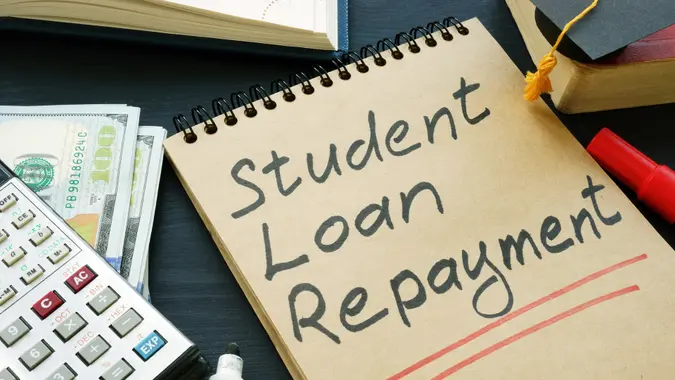3 Smart Student Loan Moves for New Grads Without a Paycheck

Commitment to Our Readers
GOBankingRates' editorial team is committed to bringing you unbiased reviews and information. We use data-driven methodologies to evaluate financial products and services - our reviews and ratings are not influenced by advertisers. You can read more about our editorial guidelines and our products and services review methodology.

20 Years
Helping You Live Richer

Reviewed
by Experts

Trusted by
Millions of Readers
You’ve just wrapped up a graduate program in healthcare and you’re eager to enter your field. However, you can’t get a job until you’ve passed a board exam that allows you to get licensed — and in the meantime, your lender expects payments to begin. What’s the best way to manage student loans when you don’t yet have income coming in?
That’s the question GOBankingRates reader Vanessa submitted to our Top 100 Money Experts series.
Whether they’re entering healthcare or another field, her question resonates with many recent graduates — after all, a degree doesn’t guarantee instant income. To get advice on how to navigate this common situation, we turned to Michelle Kruger, Ph.D., CFP, an author, teacher and financial planner who specializes in helping everyday people manage their money.
The good news is that people in Vanessa’s position — needing to repay student loans before they’ve cashed their first paycheck — have options.
Look Into Deferment Options
If Vanessa doesn’t yet have the income to cover both living expenses and loan payments, Kruger says that’s a common challenge among new grads. In these cases, she recommends taking advantage of deferred repayment plans.
“Federal student loans usually offer a six-month grace period post-graduation before payments begin,” she said. “Some private loans also provide grace periods, though interest still accrues.”
To avoid being buried by interest, Kruger suggests that — if possible — borrowers make even small payments during the grace period can help reduce long-term interest costs.
Explore Income-Driven Repayment Plans
While Vanessa didn’t specify her loan types, Kruger notes that most federal borrowers qualify for income-driven repayment plans like PAYE, IBR or ICR.
“These plans cap monthly payments based on income and forgive any remaining balance after a set term,” Kruger said.
In the past, borrowers have also considered the Saving on a Valuable Education (SAVE) plan, though legal challenges have raised questions about its long-term viability.
For readers unfamiliar with these plans, here’s a brief overview:
- Pay As You Earn (PAYE): Caps monthly payments at 10% of a borrower’s discretionary income.
- Income-Based Repayment (IBR): Bases payments on income and family size, capping them at a manageable level. Remaining balances are forgiven after 20 or 25 years of qualifying payments.
- Income-Contingent Repayment (ICR): Payments are the lesser of 20% of discretionary income or what you’d pay on a 12-year fixed plan, adjusted for income. This is the only income-driven plan available to Parent PLUS borrowers (if consolidated).
Kruger encourages borrowers to explore their eligibility for these programs, especially if they’re in a temporary employment gap.
“Borrowers could also look into deferring their student loans beyond the grace period if they are expecting to get a high-paying job but have not yet started work by the end of the grace period,” she said.
Avoid Other Forms of Debt
While Vanessa is pursuing licensure and employment, Kruger advises steering clear of new debt — especially high-interest debt like credit cards.
In the meantime, she recommends building a realistic budget to cover living expenses and prepare for future loan payments. Kruger also encourages creative solutions when it comes to saving or earning extra income, even if it means working outside her chosen field for now.
“You may want to look for short-term ways to earn income outside of your career path or reduce expenses — such as living with roommates or family,” she said.
What To Do When Things Change
Ideally, Vanessa will soon be licensed and working in her field. When that happens, she’ll have the opportunity to reassess her repayment strategy.
“You can change your repayment plan by contacting your student loan servicer,” Kruger said. “StudentAid.gov has a helpful Loan Simulator tool that allows borrowers to evaluate how different repayment plans will impact their monthly payment, repayment period and total interest paid.”
Bottom Line
For new graduates like Vanessa, the idea of repaying student loans without a steady paycheck can be daunting. But with smart budgeting, careful use of repayment options, and a willingness to be flexible and resourceful, it’s entirely manageable.
This article is part of GOBankingRates’ Top 100 Money Experts series, where we spotlight expert answers to the biggest financial questions Americans are asking. Have a question of your own? Share it on our hub — and you’ll be entered for a chance to win $500.
 Written by
Written by  Edited by
Edited by  Money Expert
Money Expert 
























